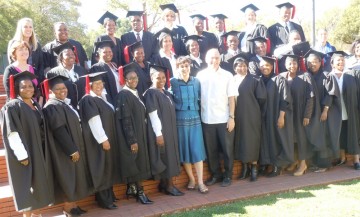The objective of this project was to build capacity of South African researchers, students, and health practitioners on how to design, implement, and evaluate workplace-based interventions for HIV and tuberculosis (TB) prevention in a format that is feasible for busy practitioners with the ultimate goal of improving working conditions for healthcare workers.
Building Capacity to Design, Implement and Evaluate Participatory Action Research Projects to Decrease the Burden of HIV and Promote and Protect the Health and Safety of the Healthcare Workforce: A South African- Canadian Collaboration
Health workers have been identified as a high-risk population and are the largest workforce in the world. This project was designed to build capacity consistent with the identified needs in the recent guidelines on improving health workers’ access to HIV and TB prevention, treatment, care and support services, jointly endorsed by the World Health Organization, the International Labour Organization, and the Joint United Nations Programme on HIV/AIDS.
The training was delivered as a 1-year certificate programme offered by the University of Free State (UFS), in collaboration with the University of British Columbia (UBC), for health practitioners from across the Free State province in South Africa who have responsibility for HIV and TB prevention in their workplace. Participants committed to attending three 5-day in-class sessions, as well as to design, implement, and evaluate a relevant group project in their workplace. Twenty-eight healthcare practitioners, all of whom had to have a letter of support from their employer explaining the need for this research training and confirming support were accepted into the programme. Participants came from various healthcare backgrounds – including a variety of HIV and TB prevention positions – nursing, infection control, community development, and occupational health.

Programme participants with students/mentors from the University of British Columbia, the International Labour Organization and the University of the Free State. (SPPH student Rabia Khan back, centre)
The first face-to-face session took place in April 2011, and was highly successful, as was Module 2, held in September 2011. The participants then formed 8 groups to conduct research projects in their healthcare workplace on the theme of HIV (and TB) prevention. These projects included a hospital-wide project on HIV/AIDS prevention at Pelonomi Regional Hospital – focusing on designing, implementing and evaluating an intervention combating HIV stigma and discrimination to encourage HIV counselling and treatment (HCT) of healthcare staff and a hospital-wide project to implement a surveillance system for HIV and TB, to better monitor occupational exposures, and needs of staff for prompt follow-up for post-exposure prophylaxis, and/or treatment at Universitas Hospital. These and the other six group projects all involved the collection and analysis of HIV and TB data for prevention of transmission and monitoring the effectiveness of interventions.
During the final module in May 2012, all programme participants presented the findings of their group projects to academics, hospital CEOs, representatives from the department of health, union representatives, facility managers, and their families. The graduation ceremony was a formal event that was enjoyed by all 100+ attendees.

Certificate programme graduates and UBC mentors/students, University of the Free State, Bloemfontein, South Africa. (faculty members Drs. Yassi and Spiegel, front centre)
//
